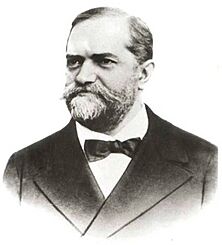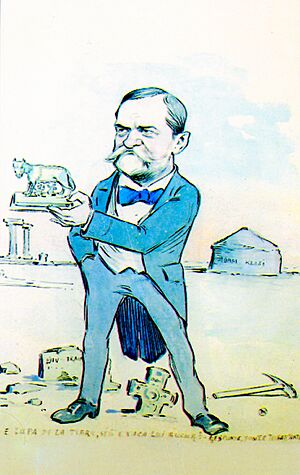Grigore Tocilescu facts for kids
Quick facts for kids
Grigore Tocilescu
|
|
|---|---|

Professor Grigore Tocilescu
|
|
| Born | 26 October 1850 Fefelei village, Mizil town, Prahova County, Romania
|
| Died | 18 September 1909 (aged 58) |
| Nationality | Romanian |
| Citizenship | Romanian |
| Known for | Marele Dicționar Geografic al României, research on Dacia |
| Scientific career | |
| Fields | History, Archaeology, Epigraphy, Folkloristics |
| Institutions | Romanian Academy |
Grigore George Tocilescu (born October 26, 1850 – died September 18, 1909) was an important Romanian historian and archaeologist. He also studied old writings (epigraphy) and traditional stories (folklorist). He was a respected member of the Romanian Academy.
Tocilescu taught ancient history at the University of Bucharest. He helped create a huge book called The Great Geographical Dictionary of Romania. He also worked as a general secretary for the Romanian Ministry of Teaching. He was a senator several times. Tocilescu was one of the first Romanian historians to deeply study the ancient land of Dacia.
Contents
Early Life and Education
School Days
Grigore Tocilescu was born in Fefelei village, near Mizil town. He went to primary and secondary school in Ploieşti. After that, he moved to Bucharest. There, he finished his studies at the Saint Sava National College.
University Studies
Tocilescu continued his education abroad. He studied at universities in Prague and Vienna. In Vienna, he earned his Doctor of Philosophy degree. He also got a license to practice law. When he returned to Romania in 1881, he became a professor. He taught ancient history and epigraphy at the University of Bucharest.
Helping Others Learn
In 1884, Professor Tocilescu helped create the Archaeological Seminary's Library. He gave a grant to make this library possible. This helped many students and researchers.
Professional Work and Discoveries
Studying Old Texts
In 1877, Tocilescu traveled to Moscow. He visited the Rumyantsev Museum. There, he copied an old book called From the Beginning of the First World. This book was written by Mihail Moxa. Tocilescu sent his copy to Bogdan Petriceicu Hasdeu, who then published it. The book tells a universal history. It starts with the "creation of the world." Then it talks about ancient people like the Assyrians, Egyptians, and Persians. It also covers the Roman Republic and its emperors. The book ends with early battles between the Turks and Romanians.
Later, Tocilescu went to Paris. He continued his studies in French archives and libraries. He was looking for information about Dimitrie Cantemir. While there, he also attended courses at famous schools. These included the Collège de France and the École Pratique de Hautes-Etudes at the Sorbonne.
Archaeology in Romania
When he came back to Romania, Tocilescu became the director of the National Museum of Antiquities. He also kept his job as a professor at the University of Bucharest. He was a pioneer in Romanian archaeology. He started many important archaeological digs in the Dobrogea region.
Important Books and Roles
Grigore Tocilescu was a co-author of The Great Geographical Dictionary of Romania. This huge work was published in five volumes between 1898 and 1902. He also served as the general secretary at the Ministry of Education. He was a senator multiple times.
Tocilescu was one of the first historians to truly study the ancient civilizations in Dacia. He wrote three very important books:
- Dacia before the Romans (Dacia înainte de romani)
- The Adamclisi Monument (Monumentul de la Adamclisi), which he wrote with O. Benndorf and G. Niemann
- Fouilles et recherches archéologiques en Roumanie (Archaeological Excavations and Research in Romania)
He also helped republish other key historical works. One example is The Chronicle of the Antiquity of the Romanian-Moldavian-Vlachs by Dimitrie Cantemir.
Reissued Works
Some of Grigore Tocilescu's works have been reissued over the years:
- 534 Slavo-Romanian historical documents from Wallachia and Moldova, regarding the connections with Transylvania (1346-1603) from the archives of Brașov and Bistrita in original Slavic text accompanied by Romanian translation, first printed in Vienna in 1905-1906, reprinted in 1931.
- History of the Romanians, re-edition in 2010.
- Ballads and doines (reissue), published in 2010 and 2011.
See also
- Dacia
- List of Romanian archaeologists
 | Precious Adams |
 | Lauren Anderson |
 | Janet Collins |


